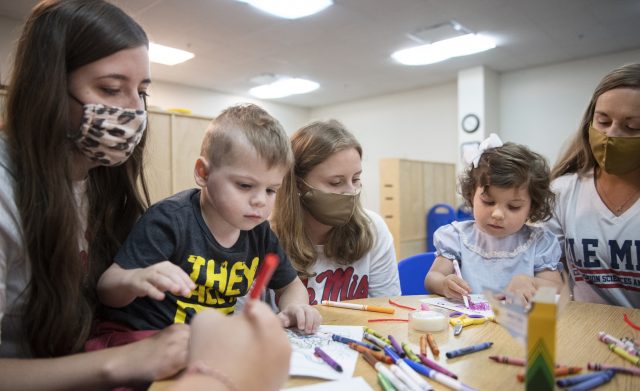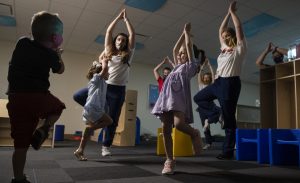
Communication sciences and disorders students Macy Davenport (left), of Greenbrier, Tennessee; Mary Garrard (center), of Jackson, Tennessee; and Meredith Bradford (right), of Madison, use art as therapy with children involved in the Preschool Language Group at the university’s South Oxford Center. Photo by Logan Kirkland/Ole Miss Digital Imaging Services
OXFORD, Miss. – Preschoolers with language disorders are getting help preparing for kindergarten through the Preschool Language Group, hosted by the University of Mississippi‘s Department of Communication Sciences and Disorders and its Speech and Hearing Clinic.
The Preschool Language Group is a program for children ages 2-5 who have a mild-moderate expressive or receptive language disorders, mixed language delay or severe phonological processing disorder/developmental apraxia of speech. The hope is that participants can enter a regular classroom for kindergarten.
The program has seven children participating two hours per day, twice a week. The classroom is language-based with group goals, plus individual sessions with goals based on each child’s specific needs. The program has had excellent success in transitioning children into regular education/day school programs.
“We start every day with free play, move to circle time/music and movement and introduce/explore themes like space, science – life cycle of a plant and simple science experiments – and introduce different cultures,” said Amanda deVera, a speech language pathologist and instructor in the department. “We have a related snack and art project, individual pull-out sessions and a goodbye circle during our two hours together. It’s busy.”
This summer, the children made rocket ships when talking about space, planted seeds when talking about the life cycle of plants and used a play animal safari to introduce yoga into music and movement.

UM students lead children in a yoga exercise as therapy as they practice listening and responding through motion as part of the Preschool Language Group. Photo by Logan Kirkland/Ole Miss Digital Imaging Services
“Our snacks during space week were rice cakes with bananas to resemble the moon; we made lemon fizzes when talking about science and painted cheetahs with our hands when talking about animals on safari, which is displayed on our bulletin board now,” deVera said.
Rachael Waller has two children involved with the program. Her youngest, 3-year-old Athea, began intervention with teletherapy. While Athea has delay of speech, 5-year-old Killian has developmental apraxia of speech, or DAS, and severe expressive speech disorder.
DAS is a motor-based speech disorder that makes it difficult to sequence sounds in words, resulting in unintelligible speech because of distortions, deletions and idiosyncratic errors. The condition can be related to literacy issues and other possible speech disturbances later in life, but when children with DAS get treatment early and consistently, outcomes are more successful.
“Both my children enjoyed the group sessions, and Killian really enjoyed when all the children discussed their current emotions,” Waller said. “My husband and I have noticed that both of the kids are more talkative and outgoing. Killian and Athea both are producing full sentences.
“The Zoom meetings, at-home challenges and in-person parent meetings with the students and instructors helped me and my husband with goals and out-of-the box ways to help and challenge our children at home.
“PLG truly helped our kids tremendously, and we couldn’t be more appreciative.”
For more information about services offered by the UM Speech and Hearing Center, click here or call 662-915-7652.